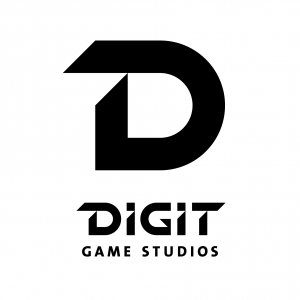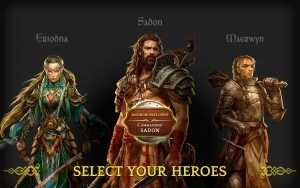After developing mobile hit Kings of the Realm, DIGIT Game Studios is planning its next offence with a recruitment campaign and a AAA title based on a “huge” IP. CEO Richard Barnwell talks to Pavel Barter about how the company became the biggest developer in Ireland, why a multi-platform approach suits its free to play strategy MMO games, and how working on RuneScape gave him a vision of the future.
In a warehouse on Dublin’s City Quay, game developers are working at their desks in the unlikeliest of surroundings. This 18th Century building has wooden beams, low doorways and archways. There are large open plan areas, designated for prototyping and commercial work, white board plots, formal spaces and comfortable areas with pool tables.
It’s like the Google of game development. That’s the desired effect, explains Richard Barnwell, founder and CEO of DIGIT Game Studios. “When we founded the business, there was an understanding we would have to compete with Google and Facebook for engineering talent. But we could never compete with those guys on salary alone.”
DIGIT could compete on office environment, however, so they forged an environment that encourages creative thought. “We’re trying to create an ethos – if you want to make great games, you have to enable people’s brain power. You don’t do that by putting them in a formal environment – it just doesn’t work.”
The DIGIT workspace is spread across three floors and the business is now re-kitting the premises to make it even less formal. The surplus of space is fortunate. DIGIT, Ireland’s largest game developer, is on a recruitment campaign for 40 new development jobs – ranging from character artists, concept artists, to visual effects artists. Unlike some development studios, DIGIT has no desire to divide its talents in studios across the world, or have its developers work remotely. The company ethos is to work together, brainstorm together, and communicate face to face. That way, productivity and pace can be maintained.
Most of the current 20-strong development team is Irish. But DIGIT thinks global when it comes to recruitment. “We’ve been fortunate relocating Irish people back home who moved abroad and were working in the UK or U.S.,” says Barnwell. “We’ve had hundreds of applications already, so we are working our way through them. There is a big chunk [of talent] already in Ireland. From a business perspective, it’s more cost effective for us to hire locally.”
Kings of the Realm

DIGIT is riding the crest of a wave due to the success of its free to play strategy MMO Kings of the Realm (KOTR), launched September 2014. In this fantasy game – financed through in-app purchases and micro transactions – players build fortresses, develop armies and battle creatures andrival human players. Free to play games are usually brightly coloured casual puzzlers, but DIGIT’s developers bring a love of strategy to the business.
“We like hardcore strategy games,” explains the CEO. “We appreciate casual games, but we don’t hire people who want to make them. If you were to ask someone in the studio about their favourite game, no one is going to say Candy Crush. It’s Age of Empires or Command and Conquer.”
DIGIT’s greatest challenge has been to marry traditional game mechanics with new mobile monetisation mechanics. The studio wants to make hardcore games that suit touch devices. This strategy has worked so far for KOTR. Although the game is niche, many fans sink 10 to 12 hours per day into the game. Administrators have to watch players to ensure they’re not consuming too much content in too many big stints. What makes this MMO particularly unusual is its transmedia approach. Players can compete on browser, iOS, Android, and Windows devices. KOTR also appears as a series of books published by Penguin.
“We were intrigued by what would happen when you took away device specific barriers,” explains Barnwell. “You can play with friends, no matter what device they have, in one central game world. What’s fascinating is the amount of people who happily switch between devices. People playing on mobile will often play on the browser, and bigger screens, once they get fully engaged.”
Developing the infrastructure to facilitate multiple platforms was not easy. Cross platform game engine Unity helped, but it can only do so much in an expansive MMO world. Each platform has its own unique behaviours – different billing providers, security, account management systems, etc. – so the developers built an entire operating system for KOTR.
However, the studio lacked the marketing budget, or resources to understand analytics and app store optimisation, that would bring more players to the game. They also needed specialist help on licensing and IP issues. So for the first six months of 2015, Barnwell met companies to discuss expansion options. Serious conversations kicked off with Scopely, a U.S.-based publisher and strategic investor. Numerous U.S. trips later, contracts were signed.
 Scopely Deal
Scopely Deal
“They made a multi-million investment into DIGIT,” says Barnwell. “As part of that, they have exclusive rights to publish our titles. DIGIT is going to release multiple titles over the next few years and Scopely will bring them to market. That gives us the best of both worlds. They can focus on what they’re good at – publishing, media relations, relations with IP holders – while we focus purely on building games. Our entire operation is games development. There will be no call centres, marketing, or user acquisition here in Ireland. Scopely will handle all that.”
Scopely also develops casual games in-house – many of which have gone viral – so there is a common bond between the two companies. Scopely games include Mini Golf MatchUp (2013), which was number one in the Apple App Store in 28 countries and Yahtzee With Buddies (2015), an officially-licensed Yahtzee game which saw 1 million downloads in the first four days and over 10,000 downloads an hour.
From Jagex to Jolt to Digit
DIGIT, however, is also the culmination of Barnwell’s experience in the industry. Hailing from the Cambridge area of England, he left college in 2004 to work for Jagex, the independent games developer and publisher behind RuneScape, one of the world’s largest free to play online games. “Traditionally, I liked to play session-based strategy games. Command and Conquer was huge for me. I was also an FPS fan: Goldeneye is one of my fondest memories. But I began thinking about where the games industry was going. I spent a lot of time travelling the globe with Jagex and seeing what was going on. Free to play was thriving in Asia.” Over his four year tenure at Jagex, as part of the senior management team, the company grew from a small band of developers to a cast of hundreds.
“I think RuneScape still holds the record for being the biggest free to play game. It was mind blowing. I think it’s now hit about 250m registered accounts. Back then, the only game that was outdoing us was World of Warcraft. RuneScape was initially a subscription model. There was free content and if you wanted more you had to pay to become a subscriber. It was a little different to today’s in app purchase model.”
In 2010, after a stint outside the games industry with a cloud hosting company, Barnwell moved to Ireland to become CEO of Jolt Online Gaming. However, the online game company, which was partially owned by U.S. retailer GameStop, closed its doors two years later. “The business wasn’t profitable – it wasn’t covering its costs,” reasons Barnwell of Jolt, which produced titles such as Legends of Zork.
“The parent company decided it was no longer a viable investment and closed the subsidiary. GameStop is a €13bn a year a business so, of course, it has shrewd approaches to ensuring it keeps its share value at a certain level. There were quite a few titles out before [the business closed] that were not hits. It was very sad. There were lovely people at Jolt and I’m glad to see nearly all of them stayed in the industry. We’ve a few here at DIGIT…”
Jolt’s demise did not dissuade Barnwell from founding DIGIT in Ireland in 2012. The reasons for basing the studio in Dublin went beyond financial incentives, development talent, or three-storey warehouses.
“There is a massive lack of competition here for us,” he explains. “We quickly became the largest developer in the country. Other studios are mostly community based. This is a country that has a very educated workforce, great access to Europe, some interesting finance structures. Furthermore, Enterprise Ireland are unsung heroes.”
Barnwell’s vision for DIGIT involves assisting the gaming eco system in Ireland through incubation projects. It is a good time for mobile games, he believes, as “86% of all app installs are for games, which is just crazy. However, I think only the top games will succeed.”
DIGIT has big plans for the future. Work is continuing on KOTR, which will see its “ultimate vision” come to fruition over the next 18 months. The studio is also developing a AAA title, based on an existing IP, which Barnwell describes as “huge”, due for launch in summer 2016. “If it’s not the biggest mobile launch next year, I’d be surprised. The marketing budgets alone are staggering. It’s going to be the largest AAA quality game ever built in this country.”
DIGIT wants to pave the way for a new wave of Irish game development, but Barnwell is thinking long term. “When we first started DIGIT, we wanted to ensure we ran the business in a safe, stable way, while remaining creative. Our team can rely on us as founders to keep the business stable. Some start-ups spend all their money on office space and buy everybody €10,000 worth of laptops. Six months later they go bankrupt. We have a traditional approach, focusing on profitability and running the business sensibly. Any excess we decide to spend, we ask ourselves, How does it affect the company’s stability?'”
The company is not shy about its vision of the future, though, with DIGIT recruitment advertisements appearing on the sides of buses around Dublin. “We’re over three years old and in a great position financially,” says the CEO. “We’ll be around for years to come.”
Much like players in Kings of the Realm, DIGIT has built a fortress and created strategic alliances. Now it is setting out on a mission to conquer the mobile games industry.



